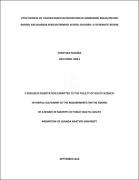| dc.description.abstract | In order to address the high malnutrition rates in Sub Saharan Africa, majority of nutrition
programs have continuously been streamlined through the health system yet this has not
yielded results as expected. The education sector on the other hand has showed immense
capacity in addressing some challenges such as elimination of short term hunger through
School Feeding Programs yet little attention has been given to teachers as far as implementing
health and nutrition interventions. With an increased school enrolment rate in Sub Saharan
Africa, there is need to reach all these children through high impact low cost interventions.
Objectives
This study therefore set out to consolidate evidence about the effectiveness of teacher- based
interventions in addressing Malnutrition in Sub Saharan Africa through a Systematic Review and
Meta Analysis of literature since no study has attempted to. This study was underpinned by
Barnfenbrenner’s Ecological Systems theory that emphasises the role of the surrounding
environment to the growth and development of a child.
Methodology
A comprehensive search strategy through online databases that included EBISCO, PubMed,
BASE, Cochrane, Google Scholar, LILACS, Project MUSE, TRIP Database and Emerald Insight gave
rise to 95,734 studies in total. These were identified and taken through a series of screening
stages such that the most eligible as per the inclusion and exclusion criteria were included to
answer the review question.
Study selection
Three studies met the inclusion criteria and these included Eboh and Boye (2006) in Nigeria;
Mbithe et al (2008) in Kenya; Steyn et al (2015) in South Africa. Risk of bias assessment and
quality of the study appraisals were carried out per included study.
Findings
Teacher- based interventions have a positive effect on nutrition status of primary school
children, school attendances, are sustainable and reach many children. The outcome measure
of standardised mean difference gave a positive outcome (0.025 at 95% CI) although this was a
small effect outcome.
Limitations
There are limited numbers of high quality Randomised Controlled Trials with teachers in
Primary Schools taking up active roles in the implementation process. Many studies have
external personnel to implement an activity which leaves the teachers short of knowledge and
skills for sustainability of the interventions.
Recommendations
There is need to actively involve teachers in the primordial and primary prevention stages of
malnutrition through strengthening nutrition education, supplementary programs and school
gardening. This therefore calls for training, capacity building and empowerment of teachers as
drivers of change.
Conclusion
Teachers have a big role to play in the fight against Malnutrition in Sub Saharan Africa since
there are more schools than health facilities and more teachers than health workers. | en_US |


